- Home
- Michael Dobbs
Churchill's Triumph Page 11
Churchill's Triumph Read online
Page 11
His entire life had been a trial. He wasn’t much of a Christian and he didn’t pray, yet every night before he went to bed he would spend a few moments in reflection, placing himself in the dock. After Sawyers had left him and before he turned out the light, he would retrace the events of the day, trying to decide how much he had achieved and whether history would judge it to be enough. He never went to sleep without shaking hands with history. He put others to the test, too. Today he had tested Roosevelt and Stalin at the afternoon plenary. And they had both failed. Miserably.
Afterwards he had returned to the Vorontsov in a black mood. He had stamped. He had cursed. He had thrown things. He had been impossible. So Sawyers had sent for Sarah, and she did what all the Churchill daughters did in such circumstances. She listened.
“Franklin is such a. . . ridiculous romantic!” He waved his glass of wine. It wasn’t the first. It circled round the dinner-table like a radar beam searching for its target. “He comes to Yalta hoping to change the world, like Moses descending from his mountain and bringing his tablets of stone on which are carved but three words. The United bloody Nations.” He spat them out in frustration. “It is the only thing he truly cares about. Peace on earth and unity among all the tribes, he proclaims! Then he spends his day sucking up to the Bolshevist brotherhood in the hope that those heathens will swallow it.” He threw back the last of his wine. Sawyers hovered, waiting to repair the damage.
“And you know what, Mule?”
“Papa?”
“Stalin hadn’t even read the papers. The president sent him a draft proposal on the United Nations last December and the bloody man says he hasn’t had a chance to read it. Too busy with the war.”
“He must have been embarrassed.”
“Embarrassed? He’s no nearer embarrassment than Sawyers is to a double first in theology. Instead he demanded to know what the Benighted Nations would do if Egypt said it wanted the Suez Canal back. I told him it was simple. The Empire would say no. So then he asks what would happen if China wanted Hong Kong back—would the Empire keep on saying no, and if it did, what was the point of the United Nations? It was a wretched set-up, Mule, with Franklin and Stalin like footpads out to waylay the empire—just as the Pole said they would. But even that wasn’t the worst of it. . . ” His voice trailed away as he remembered.
For a while that afternoon, sunlight had swamped their meeting-place in the old ballroom at Livadia. A great fire of birch logs burned in the hearth and Corinthian columns of white marble stood guard along its walls. They sat at the circular table: Churchill in the uniform of the Colonel-in-Chief of his old regiment, the Oxfordshire Yeomanry, Stalin in the simple khaki tunic of a Soviet marshal. Roosevelt was dressed in a civilian suit, pale grey, like his face. Roosevelt, as always, was chairman, since he was the only one of the three who was head of state. It was only minutes after he had opened the session that the nature of the game became apparent. Stalin, who had arrived with only the most cursory of greetings, had quickly turned intransigent. He became blunt and boorish—largely at Churchill’s expense. He had cut across the Englishman, interrupted, ignored, mocked, sneered at him and his empire. Accused him of mounting a crusade against Russia. And the rougher the Russian grew, the more emollient Roosevelt had become. It seemed he would do anything to save his beloved United Nations.
“We should’ve stood up to him together,” Churchill was to growl later to Sarah. But Roosevelt had chosen a different course. He had let things slide, put off decisions, grew visibly upset with the discord, even waved away the fact that Stalin hadn’t bothered reading his proposal. Nothing was too much trouble, so long as Stalin remained on board.
Churchill had stayed in the game, didn’t have much choice. He had swallowed his pride, and his anger, and waited for the moment that was most important to him: the moment they were to discuss the fate of Poland.
But yet again the president had let him down. “I see the problem from a greater distance than either of you two,” Roosevelt began, as soon as they got round to it, “and I guess that makes me a little more dispassionate—but not unmindful. I have eight million Poles in the United States.”
“And not eight hundred thousand voted for you,” Stalin interrupted. “I know. I’ve been told!”
Roosevelt looked discomforted, as Stalin had intended, but he didn’t argue the point. “I know the Poles,” he continued hesitantly. “They are like the Chinese. They attach great importance to saving face.”
Those around the table were stunned by the inanity of the remark. Blood was being shed across Poland in apocalyptic quantities, and he was talking about the importance of “saving face”? Yet, for a brief moment, Stalin smiled, one of his wicked expressions of mirth that peered like a ferret from beneath his moustache. He’d already worked things out: the President wasn’t concerned about saving Polish face as much as saving his own face before Congress.
“I think we have generally agreed between the three of us that the borders of Poland will have to change,” the American leader continued. “The settlement that was made after the last war is simply not sustainable. There are large swathes of territory in the east, beyond the Curzon Line, that should rightfully be transferred back to the Soviet Union. Meanwhile, Poland gets compensation in the west, from Germany. I believe we’ve all considered this and find it a fair compromise.”
After the last war the victors had set up an inquiry under the British foreign secretary, Lord Curzon, to establish an eastern frontier for Poland. He had come up with a suggestion for a line that, as best it could, represented a fair demarcation between Russian and Polish populations. But Russia had been weak, in the throes of her wretched revolution, and the Poles had sensed a unique opportunity to press home the advantage over their eternal adversary. So their armies had marched, pushed ever further east until they’d swallowed not only the Curzon Line but merchant cities and oilfields and much, much more that lay beyond. Now the Russians wanted it all back.
“Except, perhaps, for the area around Lvov,” Roosevelt added, scrabbling at his papers, searching for his cue. “That might remain with the Poles, I suggest. A small concession by Russia but one that—I put this to you, Marshal Stalin—would be seen as an act of considerable magnanimity.”
Stalin’s mood had changed: the ferret smile had gone, replaced by a face of stone.
“However,” Roosevelt continued, emphasizing the word as though he was already preparing his retreat, “the question of borders is not nearly so important as dealing with the issue of the governance of Poland.”
“I agree,” Churchill joined in, anxious at last to establish some common ground with his American friend. “That is the most important question we must decide. For Poland to be strong, her frontiers must be constructed on something more sustainable than ancient enmity and intransigence. The present borders cannot be right. Indeed, I’ve argued the case before the British Parliament and with the Poles themselves.” He omitted to mention that neither had been impressed. He’d ended up in a brutal shouting match with the Polish government in exile in London, who had had no intention of giving an inch on their borders. “We went to war for Poland, not to defend any specific set of borders but to guarantee her independence,” Churchill continued. “That was why we fought Germany. And everyone around this table knows that it almost cost us our life. So the question is the governance of Poland. It is a matter of honor for my country.”
Stalin had been doodling idly with a red pencil while Churchill spoke, but suddenly it was jammed down upon the tablecloth and the broken point shot away like a missile. His lip curled in a snarl. “Poland already has a government.”
Which was half of the truth. As the Red Army had advanced westward, the Soviets had set up their own Polish government in the newly freed city of Lublin, from where it had poured endless buckets of scorn on those bourgeois Poles who had spent the war in London claiming to be the legitimate government in
exile. So there were not only two sets of maps, but also two governments, one sitting idly in distant London while the other was already active in most of Poland. And, in Stalin’s view, possession was power.
Roosevelt tried to intervene: “With respect, Marshal—”
Stalin was having none of it. “I’m not going to sit here and listen to this shit.” He stood up from the table.
Roosevelt’s jaw sagged in alarm. Was the Russian walking out for good? Could this be the end of it? “The Marshal has indicated his desire for a short recess,” the president blurted, improvising for the record, his voice straining as Stalin turned for the door. The Russian stamped his boots across the parquet floor as Molotov and the others bobbed in his wake. Roosevelt called forlornly after them: “Gentlemen, I suggest we reconvene in ten minutes. Thank you. . . ”
And the bear was gone.
Roosevelt leaned towards Churchill, accusation in his eyes. “Winston! For pity’s sake, we need him. We can’t do a deal on our own. No more speeches—please!”
“It is for pity’s sake that some things need to be said,” the Englishman replied, struggling to contain his hurt. “And for the sake of honor,” he added, then headed for the washroom.
The recess had been set for ten minutes. It was twenty before the Russian reappeared. More upstaging.
Roosevelt greeted him and, anxious to avoid any further difficulties, suggested they adjourn the meeting until the next day, but Stalin ignored him. The performance wasn’t yet over.
He didn’t sit down, but walked up and down behind his chair like a caged beast, beating out his frustration with his right hand upon the pocket of his tunic. When at last he spoke, the words came more quickly than usual: the interpreters struggled to keep pace, their task made more difficult not only by the characteristic softness of his voice but also the Georgian accent, which grew more pronounced when he was angry.
“The Prime Minister has said that for Great Britain the future of Poland is a question of honor,” he began, breathing heavily. “For Russia it is also a question of honor. And of life. And death.” He stopped pacing and gripped the back of his chair. His knuckles were white as his eyes darted back and forth between Churchill and the American. “Twice in the last thirty years German armies have marched through Poland in their attempts to annihilate us. It has become a corridor for our enemies. . . ”
Churchill refrained from interrupting to remind Stalin that Russia had been just as adept at using Poland as a corridor for her own armies. He found himself fascinated by the performance he was witnessing. This was the same old Stalin, like the master butcher he was, beating the steak so that it became more tender.
“It is a corridor that is going to be shut, one way or another,” Stalin continued. “You, Mr. Roosevelt, say that we must be magnanimous about the frontier, bend the line a little—but I remind you it was not the Russians who came up with this line but the imperialist Lord Curzon, with the full approval of you Americans. After the last war you said it was the fair line, the right line—yet now you expect me to crawl back to Moscow and confess to my countrymen that I have won for them even less than foreigners were willing to give them after the last war. And you talk about saving face!” He snorted in contempt.
It was an extraordinary scene. Stalin the tyrant was invoking the power of Russian public opinion! It took Roosevelt completely by surprise. He spread his hands in search of a riposte, but found nothing. Meanwhile, Churchill sat back and sipped his glass of tea, silently admiring the audacity of the man and waiting for the next attack. He knew his turn would come. It was the Russian’s script: make Roosevelt feel uncomfortable, and Churchill seem intolerable. It took the Russian only a moment to pick up his cue.
“We are given lectures about creating a strong Polish government. But no one—no one!—wants that more than Russia. Ever since the days when Napoleon and his Grand Army marched on Moscow, the enemies of Russia have taken advantage of Polish weakness.” He levered himself up on the back of his chair, trying to increase his diminutive physical stature, turning to confront the Englishman. “You surely didn’t mean what you said, Mr. Churchill. ‘We must decide. . . ’ Who do we think we are, to sit here in Yalta dickering about the future government of Poland without the participation of the Poles themselves? The arrogance of it!” He stabbed his finger into his chest, glaring across the table. “It’s said I am a dictator. But I tell you, Mr. Churchill, that I am enough of a democrat to say that what you propose is profoundly wrong. My task is to liberate Poland, to free it from beneath the Hitlerite heel, to give it new life, not to sit back and watch it become a plaything for old men.”
If Churchill hadn’t been on duty he would have applauded: it was a magnificent performance. Yet suddenly Stalin stopped. For a moment he stood stock still, his brow creased in thought. Then he turned to Roosevelt. “But perhaps there is a way, Mr. President. Will you allow a suggestion from an old dictator? Wouldn’t it be better to settle this matter directly with the Poles themselves? Why, let’s invite them here—to Yalta!”
Churchill started in alarm. “Which Poles?” he demanded, knowing Stalin meant only those in the puppet government of Lublin. The Russian was offering Roosevelt a means of retreat, a way to save face, and Churchill knew he must shoot this bird before it had a chance to fly—but already Roosevelt was cutting across him and blocking his line of fire.
“There can surely be no harm in a little more discussion,” he began, looking drained. “I’m sure we could all agree on that—but clearly that could not be a matter for today.” He was tidying his papers, drawing the plenary to a close, anxious that the other two should have no further opportunity to fall out.
“I shall summon them,” Stalin declared.
“Excellent,” Roosevelt responded.
Perhaps the Russian had meant to suggest he would send for them rather than summon them, but old habits are not easily shaken. Roosevelt hadn’t seemed to notice.
And Churchill was undone. More delay, more failure to decide, which meant that the Red Army marched ever further west.
There was nothing left of the day. The Russian was going round the table, assiduously shaking hands in farewell. He enclosed Roosevelt’s hand in both of his, a token of genuine personal warmth.
“We must have a meeting of minds on Poland,” the American was saying, almost distractedly, as though he were thinking aloud.
“In God’s good time.”
“I am determined, my dear Marshal, that there shall be no breach between us. . . If we cannot agree on this, how can we get an understanding on more vital things?”
From the other side of the table, Churchill’s attention was suddenly hooked. More vital things? What was more vital than Poland?
“You know, Marshal,” Roosevelt continued, “that we cannot recognize the Lublin government as now composed. . . ”
No to Lublin—fine. That was what they’d always agreed, Churchill and Roosevelt. But what was this new stone the American was throwing into the river? As now composed? Did it mean that if the Lublin government was tinkered with a little, a change here, a new face there, that Roosevelt might consent to it after all? Close at hand, Molotov was scribbling furiously, taking down every one of the President’s words in a little notebook.
“You mentioned the possibility of bringing some members of the Lublin government here,” the President continued. “I’d like to develop your proposal a little. We could perhaps invite some others. I know our State Department has a high opinion of. . . well, you’ll forgive me, Marshal, if I can’t immediately recall their names.” Roosevelt chuckled. “Polish names are not things that slip easily from the tongue. But I seem to remember there’s an archbishop in Kraków and a couple of professors. If we could pull some of them on board, I feel sure. . . ”
Sure? Of what was he sure? The President had noticed Molotov’s frenzied scribbling, and now he formed his words more slowl
y, as though composing a diplomatic submission.
“… I feel sure we would be prepared to examine with you the possibility of disassociating ourselves from the exiled government in London and transferring recognition to a new provisional government.”
Churchill was stunned, left gasping for breath. The wretched old fool was giving the entire game away. Didn’t he realize. . . ?
But still Roosevelt wasn’t finished. He gazed up into the Russian’s eyes. “I can assure you, my dear Marshal, that the United States will never lend its support, in any way, to any provisional government in Poland that would be inimical to your interests.”
“That is most understanding of you.”
“I give you my word on that.”
And only then did Stalin release his grip on the American’s hand.
When he moved round the table and came to Churchill, their eyes met, and left nothing unspoken.
“Remember, Marshal, for Britain this is a fight for our honor.”
The old dictator brushed his nicotined moustache with his finger and smiled, a cold, bleak expression that chilled Churchill. “Of course. It’s like the bread riots in Petrograd during the revolution,” he whispered. “Everyone fights for what they don’t have.”
***
Later that evening, as Churchill tried to drown his pain over dinner, only Sarah was allowed to see, and Sawyers to attend.
“My God, Mule, it was like being lashed to a chair and made to sit through a school performance of Macbeth and King Lear rolled into one.”
“You always said you liked my school plays.”
“Did I ever come?”
“Once. To Broadstairs. I played Alice—remember?”
“Of course. You were scintillating,” he lisped as he lied. “Stalin is like something straight out of Wonderland, you know. Whenever he speaks, the world turns upside-down and I begin to feel myself falling… I’m not sure what to do any more, Mule. He’s an actor. A ferocious bully. And he knows precisely what he wants.”

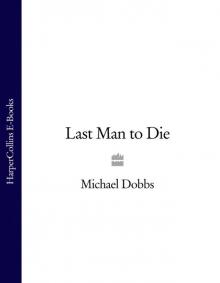 Last Man to Die
Last Man to Die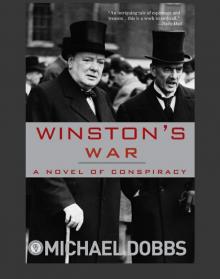 Winston's War
Winston's War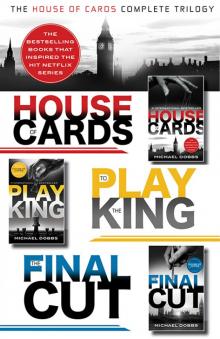 The House of Cards Complete Trilogy
The House of Cards Complete Trilogy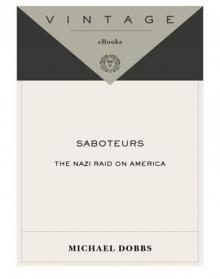 Saboteurs
Saboteurs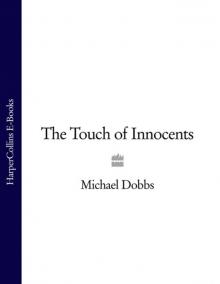 The Touch of Innocents
The Touch of Innocents WC02 - Never Surrender
WC02 - Never Surrender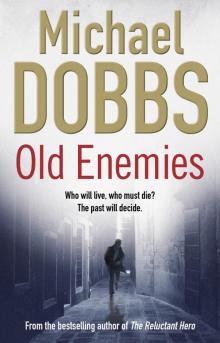 Old Enemies
Old Enemies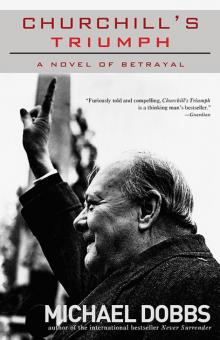 Churchill's Triumph
Churchill's Triumph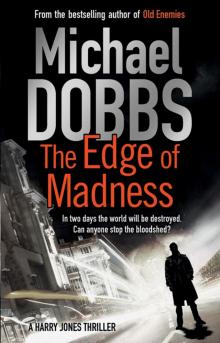 The Edge of Madness
The Edge of Madness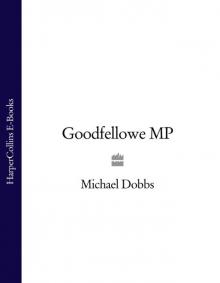 Goodfellowe MP
Goodfellowe MP The Final Cut
The Final Cut Whispers of Betrayal
Whispers of Betrayal Churchill's Hour
Churchill's Hour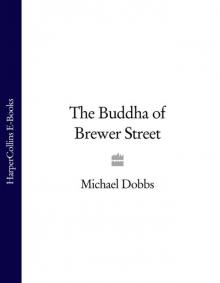 The Buddha of Brewer Street
The Buddha of Brewer Street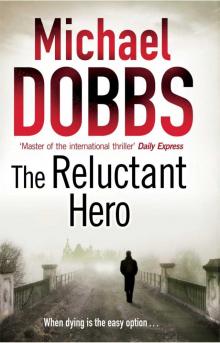 The Reluctant Hero
The Reluctant Hero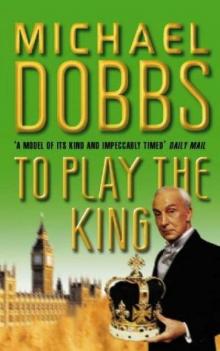 To Play the King
To Play the King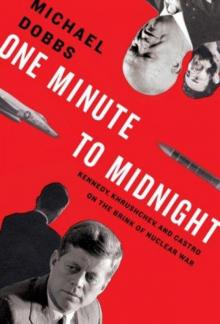 One minute to midnight
One minute to midnight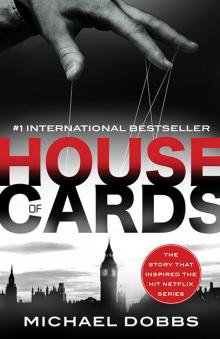 House of Cards
House of Cards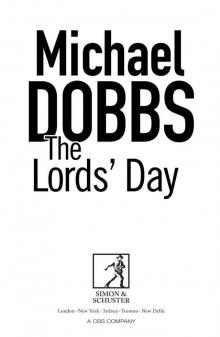 The Lords' Day (retail)
The Lords' Day (retail)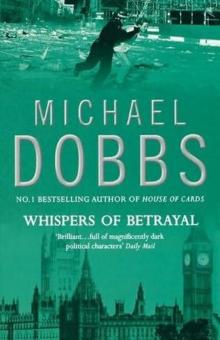 Whispers of betrayal tg-3
Whispers of betrayal tg-3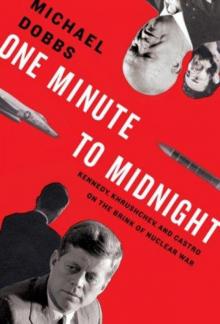 One minute to midnight: Kennedy, Khrushchev, and Castro on the brink of nuclear war
One minute to midnight: Kennedy, Khrushchev, and Castro on the brink of nuclear war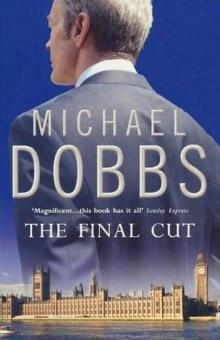 The Final Cut fu-3
The Final Cut fu-3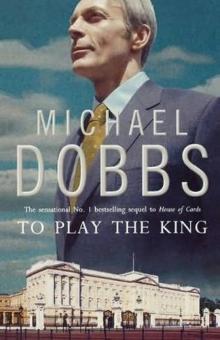 To play the king fu-2
To play the king fu-2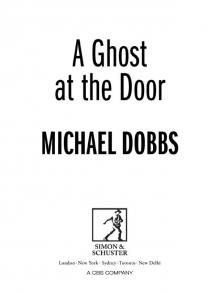 A Ghost at the Door
A Ghost at the Door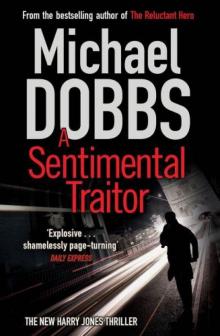 A Sentimental Traitor
A Sentimental Traitor